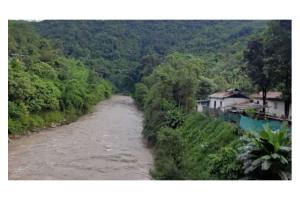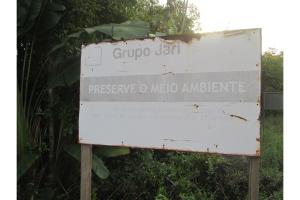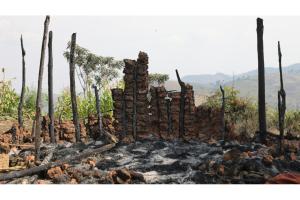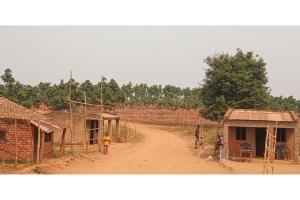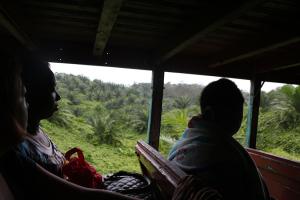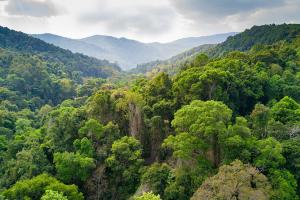Legal Land Theft
In most countries with tropical forests, governments uphold the colonial legacy that declared the State to be the owner of forest lands. This has enabled governments to legally grant land to private investors, often violating communities' customary ownership of the land. As a result, corporate activities that destroy forests continue to expand.
Bulletin articles
25 October 2023
Land related struggles in India’s Northeast states might worsen with the push to expand oil palm plantations on small-farmers and Indigenous land, threatening their food sovereignty and the ancestral practice of Jhum (shifting cultivation). On top of this, a new Forest Amendment Law will facilitate this expansion, jeopardizing further the region’s forests and Indigenous Peoples.
Bulletin articles
25 October 2023
WRM’s reply to Biofílica Ambipar’s “Clarification Note” about the article "REDD and the Green Economy exacerbate oppression and deforestation in Pará, Brazil", written by WRM and published in its Bulletin of July 2023.
Bulletin articles
25 October 2023
With the support of international funding, the establishment of the Kahuzi-Biega National Park has led to the forced and violent eviction of the Batwa Indigenous People. The DRC government recently passed a new law on the rights of Indigenous Peoples, which, though a step forward, does not apply to lands that have already been designated as protected areas, nor does it make any mention of historic injustices.
Bulletin articles
25 October 2023
This time we would like to remember a Bulletin that includes ten important contributions around the issue of ‘rights’.
Bulletin articles
25 October 2023
Exchanges between activists put the voices of those who fight to defend their territories at the center of the conversation. In September, members of communities from Brazil and Mozambique united their struggles and connected their histories once again, helping to strengthen solidarity in the fight against industrial tree plantations.
Bulletin articles
30 March 2023
At the foot of Mount Mabu, Mozambique, the expansion of rubber tree monoculture plantations has restricted Manhaua communities’ access to their own territory. This process has occurred by means of systematic abuses, thus depicting the contrast between the different ways the population and foreign capital relate to the environment where they find themselves.
Bulletin articles
30 March 2023
Forests in Cambodia have seen large-scale deforestation with rubber and cassava plantations, illegal logging and other economic interests. Besides, Protected Areas and carbon projects like REDD+ have severely affected forest communities. Despite the criminalization, communities fight back, underlining the important connection between living with their forests and having autonomy to enough, diverse and nutritious food.
Bulletin articles
16 June 2022
In Brazil, oil palm plantations are expanding rapidly, mainly in the Amazonian state of Pará. BBF (Brasil BioFuels), the largest oil palm company in Brazil, stands accused of environmental crimes and violence against indigenous, quilombola and peasant communities such as Virgílio Serrão Sacramento, a community linked to the Small Farmers’ Movement (MPA).
Bulletin articles
16 June 2022
Communities resisting the impunity and impacts of oil palm growers in Ecuador: Cases from Esmeraldas
There are currently 270,000 hectares of oil palm plantations in Ecuador. The resistance processes of the communities of La Chiquita, Guadualito and Barranquilla de San Javier in the region of Esmeraldas continue to generate outrage and solidarity among other communities, and internationally.
Bulletin articles
16 June 2022
Quilombola Communities’ Resistance Against Suzano Company in the Southernmost part of Bahia, Brazil
A conversation with the president of the Volta Miúda Quilombola Association and of the Southernmost part of Bahia Quilombola Cooperative revealed how Suzano, the world’s largest paper and cellulose corporation, continues to operate with serious violations and illegalities. Communities keep fighting to reclaim their lands back.
Bulletin articles
16 June 2022
The ‘conservation’ model in India continues to enclose forests and evict communities in a deliberate attempt to undermine and scuttle the Forest Rights Act (FRA) - a landmark legislation that strengthens the authority of communities over their forests. Meanwhile, companies are allowed to destroy forests, even inside the conservation areas.
Bulletin articles
23 March 2022
This bulletin focuses on a central cause of large-scale deforestation and dispossession of forest peoples: The imposition of land concessions as an instrument to separate, divide and map land according to economic and political interests. In consequence, the editorial alerts on the grabbing of vast amounts of hectares for Carbon Concessions.
